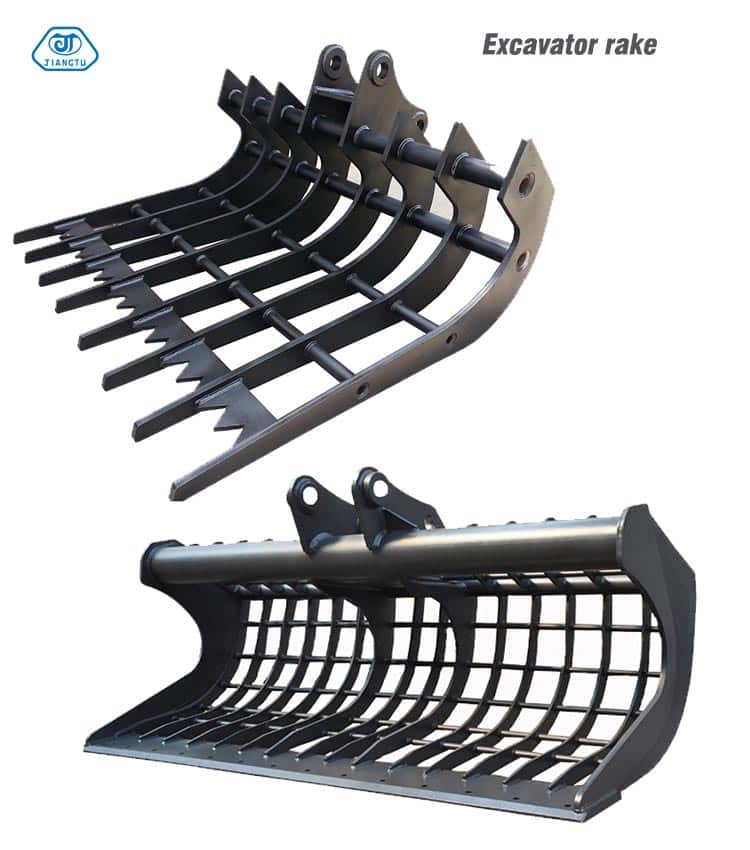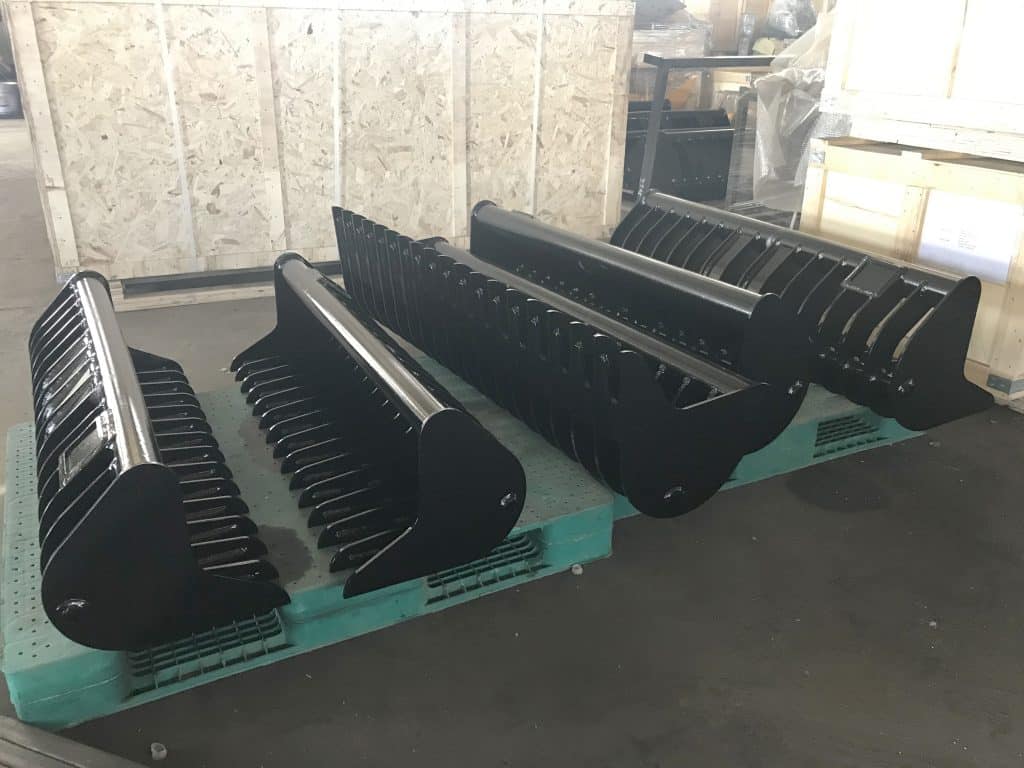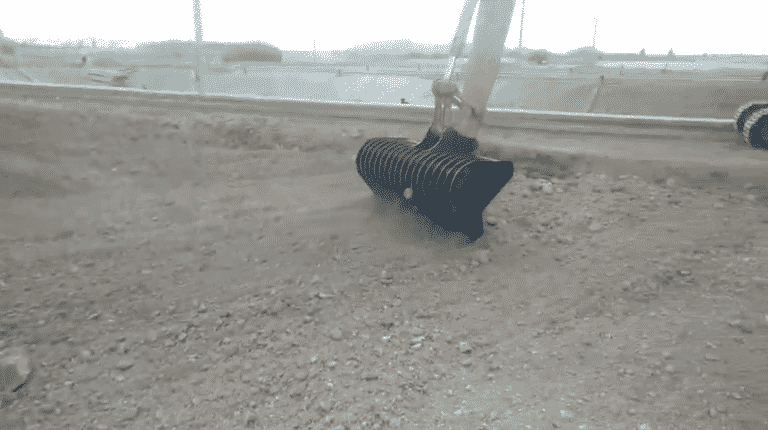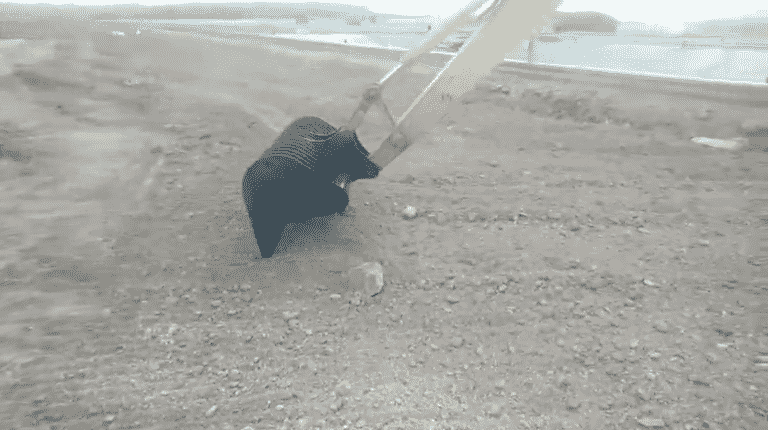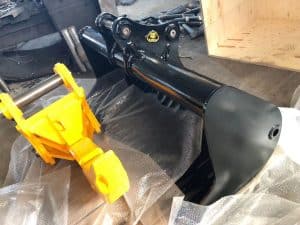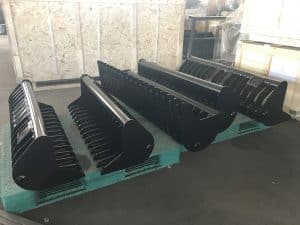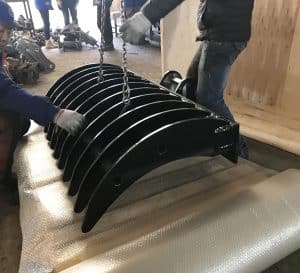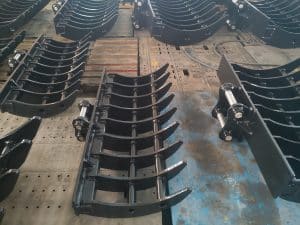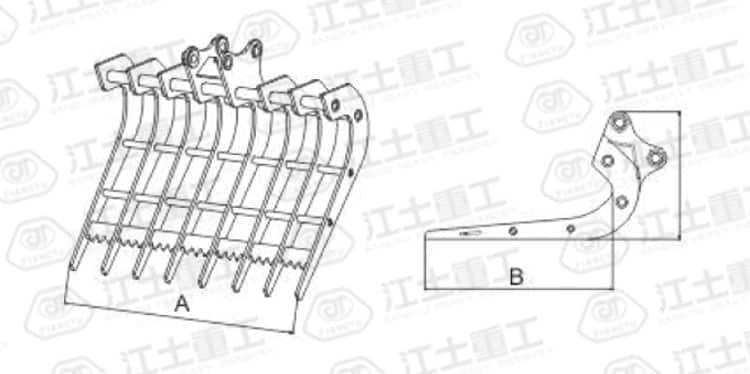The excavator rake is an essential piece of equipment for any construction site. Unlike a bulldozer, you can use the excavator rake to perform precise tasks such as grading and leveling. The versatility of this machine makes it one of the most commonly used pieces among contractors, and we believe that no construction site should go without at least one on hand.
Before buying, there are some questions you should answer: What type will best suit your needs? What size do I need? How much am I willing to spend? If you’re looking for more information about these topics or just want to learn more in general about what an excavator rake does before making a purchase, please read our complete guide below!
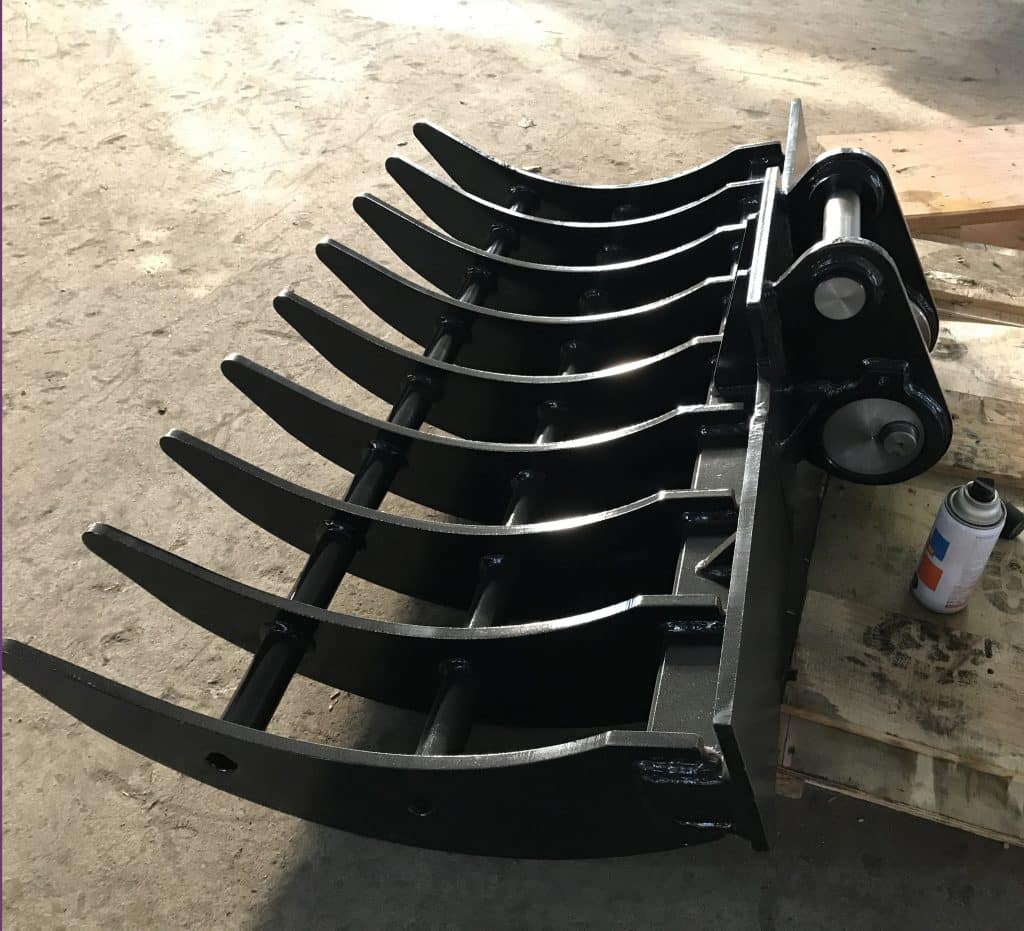
Excavator Rake
What are Excavator Rakes?
Excavator rakes are used to loosen and remove surface soil, gravel, or other material from the ground. They can be mounted on the front of an excavator or tractor.
The teeth of a rake may be sharpened steel (cantilevered) for cutting roots and rocks, or they may have rubber fingers for loosening hard-packed dirt without breaking up clods. This tool is very similar to the trencher, which uses a continuous rotating blade instead of multiple teeth.
Another common use for excavator rakes is in mass grading, where large quantities of the earth are moved and leveled using the rake and other pieces of equipment. Raking has several advantages over conventional grading methods such as backhoes or bulldozers. For example, this process is relatively quiet, dust-free, and causes minimal disruption to traffic flow or pedestrians.
#kt-layout-id_aede2a-b0 > .kt-row-column-wrap{align-content:start;}:where(#kt-layout-id_aede2a-b0 > .kt-row-column-wrap) > .wp-block-kadence-column{justify-content:start;}#kt-layout-id_aede2a-b0 > .kt-row-column-wrap{column-gap:var(–global-kb-gap-md, 2rem);row-gap:var(–global-kb-gap-md, 2rem);padding-top:var( –global-kb-row-default-top, 25px );padding-bottom:var( –global-kb-row-default-bottom, 25px );padding-left:20px;padding-right:20px;grid-template-columns:minmax(0, 1fr);}#kt-layout-id_aede2a-b0{border-top-left-radius:8px;border-top-right-radius:8px;border-bottom-right-radius:8px;border-bottom-left-radius:8px;overflow:hidden;isolation:isolate;border-color:var(–global-palette3, #1A202C);border-top-width:1.5px;border-right-width:1.5px;border-bottom-width:1.5px;border-left-width:1.5px;}#kt-layout-id_aede2a-b0 > .kt-row-layout-overlay{opacity:0.46;}#kt-layout-id_aede2a-b0 ,#kt-layout-id_aede2a-b0 h1,#kt-layout-id_aede2a-b0 h2,#kt-layout-id_aede2a-b0 h3,#kt-layout-id_aede2a-b0 h4,#kt-layout-id_aede2a-b0 h5,#kt-layout-id_aede2a-b0 h6{color:var(–global-palette3, #1A202C);}#kt-layout-id_aede2a-b0 a{color:var(–global-palette3, #1A202C);}#kt-layout-id_aede2a-b0 a:hover{color:#e76106;}@media all and (max-width: 1024px){#kt-layout-id_aede2a-b0 > .kt-row-column-wrap{grid-template-columns:minmax(0, 1fr);}}@media all and (max-width: 767px){#kt-layout-id_aede2a-b0 > .kt-row-column-wrap{grid-template-columns:minmax(0, 1fr);}}
Read More: The working principle of excavator attachments
- The Working Principle of Hydraulic Breaker
- The Working Principle of Excavator Ripper
- The Working Principle of Hydraulic Auger
- Hydraulic Grapple Working Principle
- The Working Principle of Quick Hitch Coupler
- The Working Principle of Skid Steer Tree Spade
- The Working Principle of Skid Steer Snow Throwers
Why Use an Excavator Rake?
The most significant benefit of using an excavator rake is the ease with which you can manipulate it. Rakes can move in any direction, making them ideal for landscaping and general grading alike. They work well at removing loose dirt from pavements or other hard surfaces without damaging underlying structures such as asphalt and concrete. The raised teeth also aerate the soil, making it easier for plants to grow.
Additionally, the flexibility of an excavator rake means that grading can be done in places where it would not have been possible before. It is no longer necessary to flatten and level the whole area where you want to work, which saves money and time and reduces waste from leftover soil.
Types of excavator rakes available
There are numerous types of excavator rakes available for purchase. Some may fit your site better than others, so it is important to know what each rake can do before deciding which one to buy.
| MODEL | JT04 | JT06 | JT08 | JT10 | JT17 |
| Weight(kg) | 100 | 250 | 800 | 1100 | 1500 |
| Length A(mm) | 800 | 1000 | 1300 | 1500 | 1700 |
| Width B(mm) | 500 | 600 | 1000 | 1200 | 1400 |
| Height A(mm) | 550 | 700 | 800 | 1000 | 1200 |
| Excavator Weight(ton) | 6-8 | 10-15 | 20-25 | 30-36 | 40-50 |
Safety Precautions when Using an Excavator Rake
Because excavator rakes are much more aggressive than conventional grading equipment, it is important to use them with care.
Final Thoughts
Excavator rakes are an excellent option if you need to level out large areas of dirt but do not want to spend the money on more expensive equipment. They are also helpful when working with smaller excavators that cannot carry around heavy machinery.
As long as you exercise caution, take your time and avoid working in wet environments or land that is too hard, you should be able to use your excavator rake for many years without any problems.
Get in touch with a reliable Excavator Rake Manufacturer today to find out more. They can advise you on what type of rake is best for your application and help you decide if a retrofit or new rake is the better option.
JIANGTU Excavator Rake Main Features:
.kadence-column_6bb113-5b > .kt-inside-inner-col{border-top-width:0px;border-right-width:0px;border-bottom-width:0px;border-left-width:0px;}.kadence-column_6bb113-5b > .kt-inside-inner-col,.kadence-column_6bb113-5b > .kt-inside-inner-col:before{border-top-left-radius:0px;border-top-right-radius:0px;border-bottom-right-radius:0px;border-bottom-left-radius:0px;}.kadence-column_6bb113-5b > .kt-inside-inner-col{column-gap:var(–global-kb-gap-sm, 1rem);}.kadence-column_6bb113-5b > .kt-inside-inner-col{flex-direction:column;}.kadence-column_6bb113-5b > .kt-inside-inner-col > .aligncenter{width:100%;}.kadence-column_6bb113-5b > .kt-inside-inner-col:before{opacity:0.3;}.kadence-column_6bb113-5b{position:relative;}@media all and (max-width: 1024px){.kadence-column_6bb113-5b > .kt-inside-inner-col{flex-direction:column;}}@media all and (max-width: 767px){.kadence-column_6bb113-5b > .kt-inside-inner-col{flex-direction:column;}}
Contact For Our Expert
Find out which attachment & Excavator works best for you!
.kadence-form-_b71a8f-dd .kb-form .kadence-blocks-form-field .kb-text-style-field, .kadence-form-_b71a8f-dd .kb-form .kadence-blocks-form-field .kb-select-style-field{color:var(–global-palette9, #ffffff);background:var(–global-palette3, #1A202C);}.kadence-form-_b71a8f-dd .kb-form .kadence-blocks-form-field .kb-text-style-field:focus, .kadence-form-_b71a8f-dd .kb-form .kadence-blocks-form-field .kb-select-style-field:focus{color:var(–global-palette9, #ffffff);}.kadence-form-_b71a8f-dd .kb-form .kadence-blocks-form-field .kb-forms-submit{color:var(–global-palette3, #1A202C);background:rgba(50, 150, 255, 0.92);border-color:var(–global-palette3, #1A202C);box-shadow:2px 2px 3px 0px rgba(0, 0, 0, 0.2);}.kadence-form-_b71a8f-dd .kb-form .kadence-blocks-form-field .kb-forms-submit:hover, .kadence-form-_b71a8f-dd .kb-form .kadence-blocks-form-field .kb-forms-submit:focus {color:#156fce;border-color:#1575d5;box-shadow:2px 2px 3px 0px rgba(0, 0, 0, 0.4);background:var(–global-palette3, #1A202C);}
.kadence-form-_b71a8f-dd .kadence-blocks-form-field.kb-submit-field { display: none; }
#kt-layout-id_32db69-1c > .kt-row-column-wrap{align-content:start;}:where(#kt-layout-id_32db69-1c > .kt-row-column-wrap) > .wp-block-kadence-column{justify-content:start;}#kt-layout-id_32db69-1c > .kt-row-column-wrap{column-gap:var(–global-kb-gap-md, 2rem);row-gap:var(–global-kb-gap-md, 2rem);max-width:var( –global-content-width, 1290px );padding-left:var(–global-content-edge-padding);padding-right:var(–global-content-edge-padding);padding-top:var( –global-kb-row-default-top, 25px );padding-bottom:var( –global-kb-row-default-bottom, 25px );padding-top:var(–global-kb-spacing-sm, 1.5rem);padding-bottom:var(–global-kb-spacing-sm, 1.5rem);grid-template-columns:minmax(0, 1fr);}#kt-layout-id_32db69-1c > .kt-row-layout-overlay{opacity:0.30;}@media all and (max-width: 1024px){#kt-layout-id_32db69-1c > .kt-row-column-wrap{grid-template-columns:minmax(0, 1fr);}}@media all and (max-width: 767px){#kt-layout-id_32db69-1c > .kt-row-column-wrap{grid-template-columns:minmax(0, 1fr);}}
Related Articles

JIANGTU Hydraulic Tilt Rotator Was Successfully Launched

What is JT Hydraulic Plate Compactor?

What Is JIANGTU Tilting Quick Hitch Coupler?

Jiangtu Fully Automatic Double Locking Hydraulic Quick Hitch Coupler

Troubleshooting and Solution for Excavator Grabs’ Opening and Closing

How To Choosing The Right Stump Planer For Excavator
